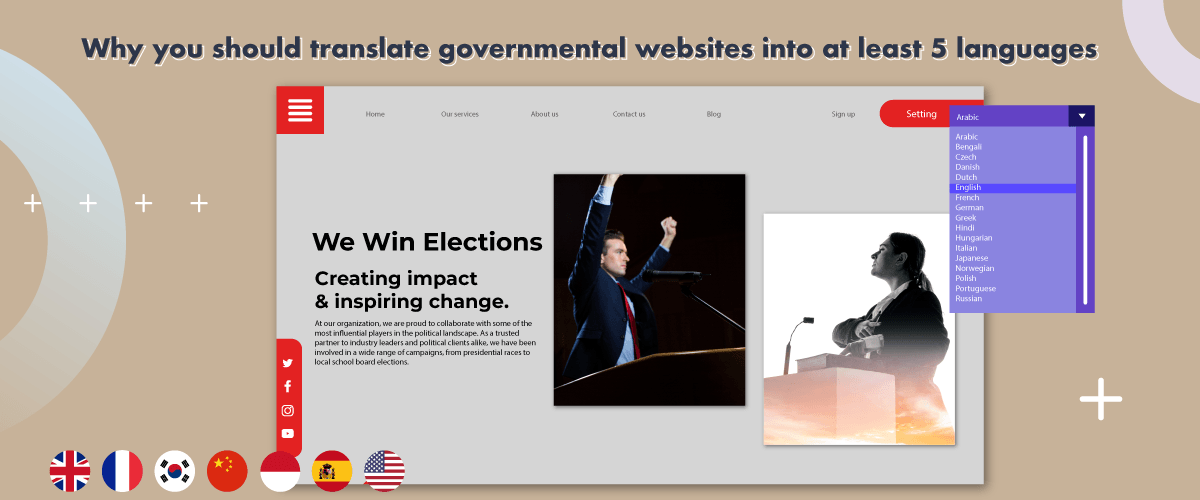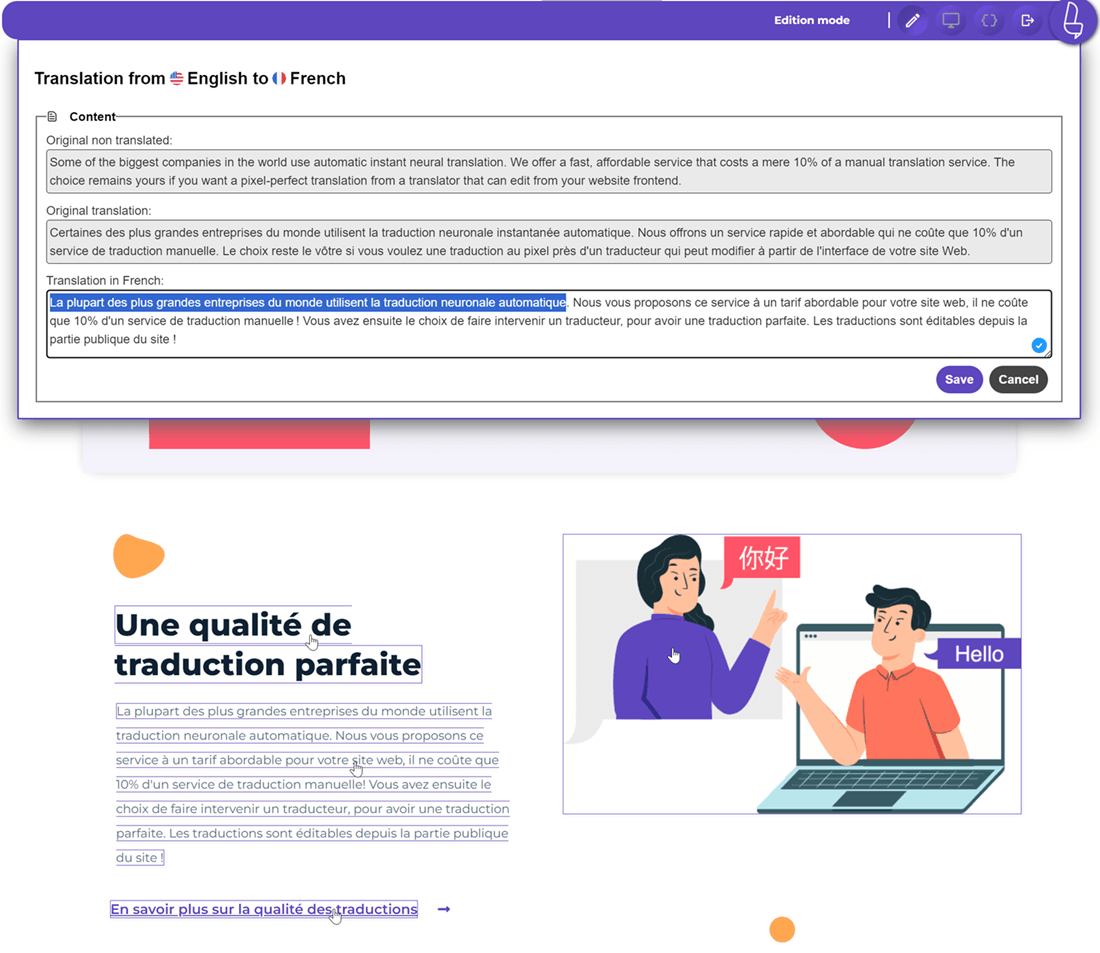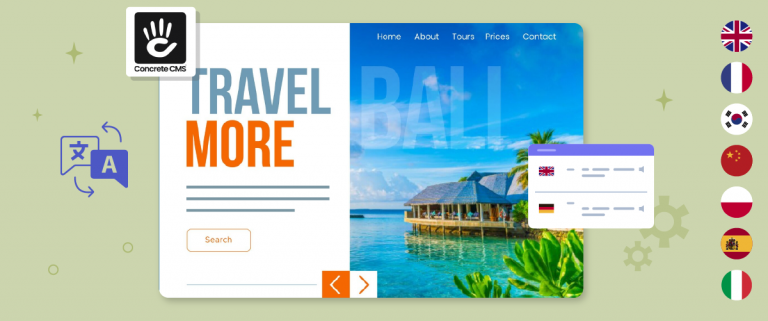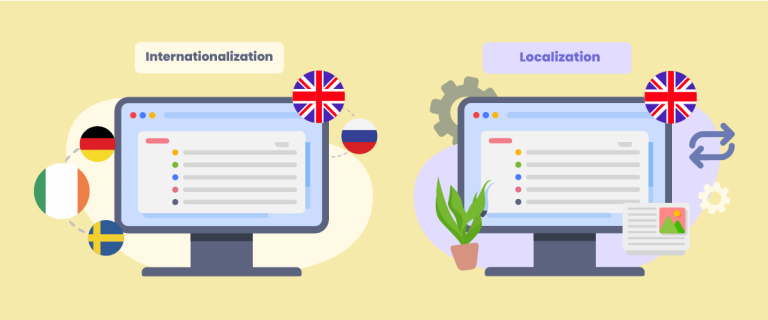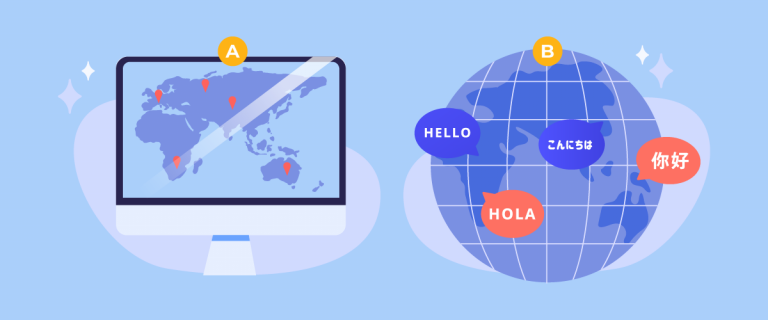Translating government websites into multiple languages is an important step in building an inclusive society, improving communications, improving public services, offering democracy, attracting economic opportunities, and fulfilling legal and human rights obligations.
By providing content websites in at least five languages, governments can ensure that their information and services are accessible to a broad range of audiences, promote effective citizen engagement, and create more inclusive societies.
Accessibility to all citizens
One of the main reasons for translating government websites into multiple languages is to promote inclusivity and ensure accessibility for all citizens and residents. Language barriers in multicultural and multilingual societies can prevent individuals from accessing important government information and services.
By offering translations, governments can reach a wider audience, including speakers of foreign languages and those with limited ability in official languages. This helps create an inclusive society where language is not a barrier to civic engagement and access to public services.
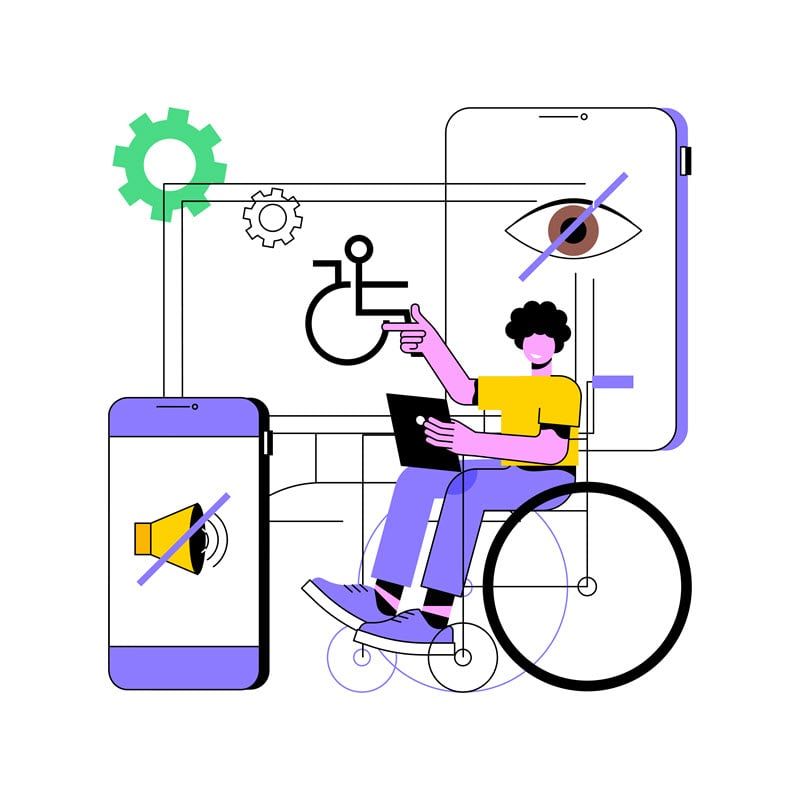
Communication with diverse communities
Translation of government websites into multiple languages is essential for effective communication and engagement with diverse communities. Many countries have multicultural populations made up of immigrants, expatriates, and indigenous communities.
These communities often have different language and cultural backgrounds. By providing information in their language, governments can create a sense of ownership, understanding, and participation in government affairs. This helps bridge communication interests and ensures that important government messages are conveyed effectively to all segments of society.
Increased demand for public services
Easily accessible information is essential for citizens to access public services, such as health services, education, employment, and legal rights. Translating government websites into multiple languages helps individuals understand their rights, responsibilities, and available services.
This has led to the demand for more efficient and effective public services, as citizens can access information in the language of their choice, reducing barriers and ensuring equal access to public resources. It also informs individuals to make informed decisions and engage meaningfully with government initiatives.
Promote democracy and civic engagement
Translating government websites into multiple languages is important for promoting democracy and civic engagement. Language barriers should not prevent individuals from accessing information about elections, policies, and government initiatives.
By providing multilingual content, governments can enable citizens to participate fully in democratic processes, make informed decisions, and engage in public discussions. This helps create an inclusive and participatory democracy where the diversity of languages is respected and accommodated.
Improving the economy and tourism
Translating government websites into several languages has economic and tourism benefits for the country. When government information and services are available in multiple languages, it facilitates international business collaboration, encourages foreign investment, and attracts business to the country.
In addition, the translated website offers tourism by providing comprehensive information on attractions, services and cultural aspects. This promotes economic growth, creates job opportunities, and contributes to the development of local communities.

Compliance with legal obligations and human rights
Translate government websites into the necessary languages to comply with legal obligations and uphold human rights. In areas with minority languages or indigenous communities, there may be legal requirements to provide information and services in their language.
Translation ensures that these communities can access government resources and exercise their rights without objection. This helps uphold language rights, promote cultural mandates, and contribute to a more just society.
Translating government websites into at least five languages is an important step in building an inclusive, communicative, and participatory society. It promotes inclusivity, enhances communication with diverse communities, enhances public services, advances democracy and civic engagement, enhances economic & tourism opportunities, and complies with legal obligations and human rights.
By removing language barriers, governments can ensure that all individuals, regardless of their language background, can engage with the government, access public services, and participate actively in the development of their communities. Those are some reasons why you should translate your government website into at least 5 languages
The challenge of translating government websites
Translating government websites is an important but complex task. Here are some of the challenges one has to face in translating government websites:
- Multiple languages: In translating government websites, translators have to deal with a variety of different languages. Countries with multicultural and multilingual populations can have dozens if not hundreds of different languages. Providing translations in multiple languages can be a complex and time-consuming task.
- Special jargon and terminology: Government websites often use special jargon and terminology that are specific to certain areas such as law, finance, and administration. Translating these terms precisely and accurately requires an in-depth understanding of the language and context of the relevant government.
- High accuracy: Government websites contain critical information and often have legal or administrative implications. Therefore, translation accuracy is very important. Even the slightest mistake in translation can cause misunderstanding, understanding, or even legal problems.
- Information security: Government websites may contain confidential or sensitive information. During the translation process, it is necessary to maintain the security of personal information and data that may be conveyed in the original or translated language.
- Consistency and style of language: It is important to maintain consistency in translation so that information presented in different languages still means the same thing. In addition, government websites must use official and standard language styles that comply with government norms.
To successfully meet this challenge, it is necessary to engage a professional translation service and ensure the use of the latest technologies to increase the efficiency and accuracy of translation such as the use of plugins or other website translation services.
Translate your governmental website into 5 languages using Linguise
Translating government websites has several challenges as mentioned above. To overcome these problems, a solution tool is needed that offers a solution. One website translation service that can be a government solution in translating is Linguise.
Linguise is able to translate various types of websites, one of which is governmental. With the various features offered, Linguise can answer the challenges of government web translation.
So why does the government have to use Linguise to translate its website? Here’s the full explanation.
Offers 80+ languages
Various languages in a country are one of the government’s challenges, but the government doesn’t need to worry because Linguise can provide a solution by providing a choice of more than 80 languages.
No matter what country you are from, find your country’s language on Linguise. Not only that, if the government wants to add several additional languages to make it easier for its citizens to access the site, you can also add whatever languages are needed.
Accuracy up to 98% translation
As explained above government websites contain critical information and often have legal or administrative implications. Therefore, translation accuracy is very important. The good news, Linguise offers translation accuracy results of up to 98%. With its AI translation technology, Linguise is able to produce translations like human translations that are natural and natural. Therefore you only need to edit the 2% again to make it perfect.
Edit translation of your governmental website with live-editor
To improve the Linguise you can use the Linguise feature, namely the live-editor front end. This feature allows site owners to edit website translations manually depending on which part they want to edit.
If automatic translation will translate all websites then this feature is different. With the live editor, you can edit only certain parts without changing other parts. This is also the right solution if there are translation results that are not in accordance with the laws, regulations that apply to the government.
How to use the live-editor feature is very easy. After registering, you will get dashboard access, then select Live Editor then select the language and start editing the translation.
Possibility to add rules of translation exclusion
What if there are words or sentences that should not be translated but instead are translated automatically and end up with a different result from the original? Don’t worry, because Linguise has also anticipated this with the translation exclusion rule feature.
This feature allows you to exclude translations, some words that might be excluded on government websites such as technical words about law, administration, or jargon from that government.
Linguise provides several types of rules, including:
- Ignore text: Used to specify text that doesn’t need to be translated, such as brand names.
- Replace text: Used to replace one text with another.
- Content exclusion: Exclude certain content from the page.
- Exclude by URL: Refers to the action of removing content based on its URL.
- Ignore inline: Used to ignore content that is dealing with multiple lines.
You can find some of the rules above on the Linguise dashboard in the Rules menu.

Add a translator to translate the website government manually
Besides being able to edit via front-end translation, you can also translate manually using the addition of a translator who is an expert in government and understands the language you use on the website.
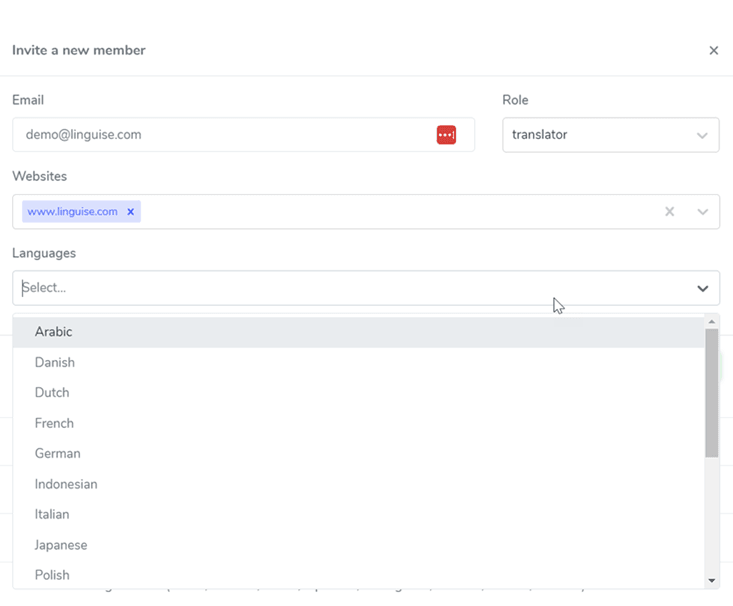
You can invite translators via an email link, how to enter the dashboard then add new members then you will be asked to fill in several fields such as email, role, language, and website to translate.
If the invitation has been received, the translator will get access to the dashboard according to the access rights that have been granted. Then, he can start using the live editor, the translation rules. Later on, the admin can check what translation has been edited by language.
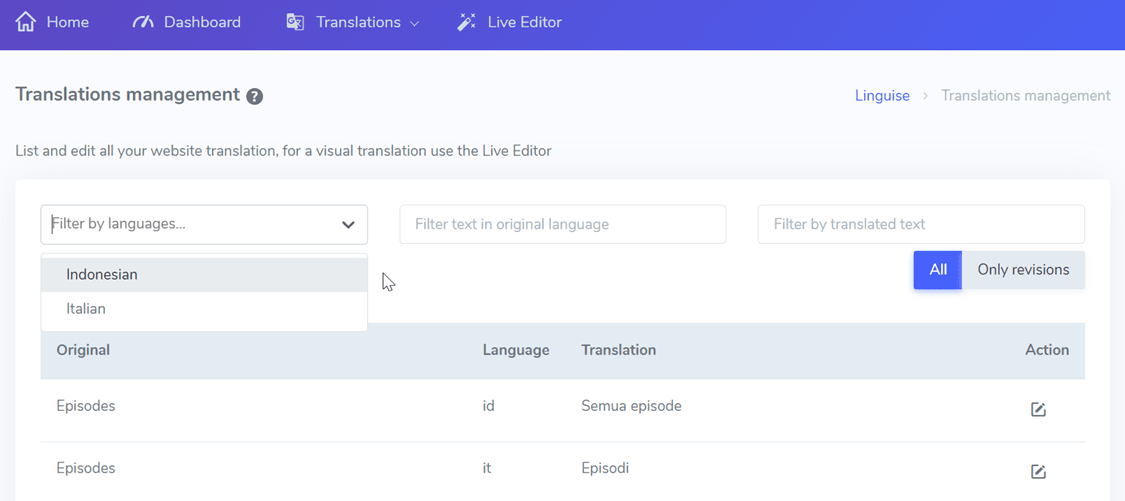
Linguise price for translating governmental websites using Linguise
Linguise offers a free trial version that can be used to translate government websites for 1 month. Within that time limit you can translate up to a limit of 600 thousand words and without any language usage limit. You can add as many languages as needed to your website.
After the trial period is up, you can continue your subscription by choosing between the following 3 Linguise packages.
Each of these packages offers the same features, it’s just that the difference lies in the number of words that can be translated. What are you waiting for? Choose a package according to the needs of your government website.
START
- INCLUDED IN 1st MONTH FREE TRIAL
- 200 000 translated words
- Unlimited translated page views
- Unlimited languages
- 1 website per plan with one month free
PRO
- INCLUDED IN 1st MONTH FREE TRIAL
- 600 000 translated words
- Unlimited translated page views
- Unlimited languages
- 1 website per plan with one month free
LARGE
- ACCESSIBLE WITH SUBSCRIPTION
- UNLIMITED translated words
- Unlimited translated page views
- Unlimited languages
- 1 website per plan
Conclusion
Translating government websites into multiple languages is important for inclusivity, communication, public services, democracy, the economy, and legal obligations.
With content in five or more languages, accessibility improves and citizen engagement increases. Translation helps communication with diverse communities and improves public services. Translation of growth supports the economy and tourism, attracts foreign investment, and creates jobs. Translating government websites also poses challenges, but technologies like Linguise can help with high accuracy and translation exclusion features. This has a positive impact on the inclusiveness of society and citizen participation in the country’s development.

